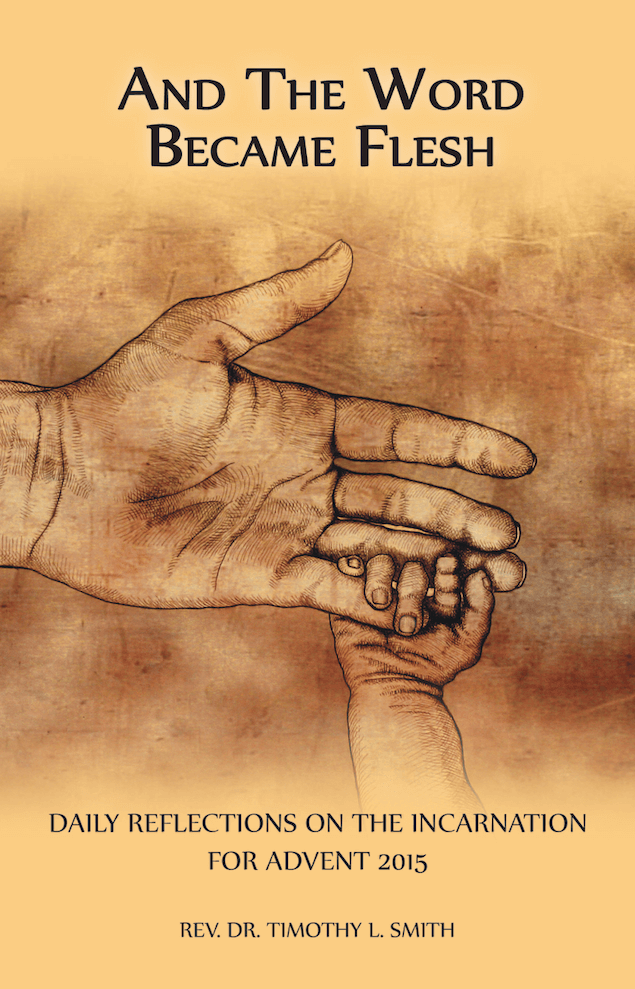The Fourth Sunday of Advent
When it was evening on that day, the first day of the week, and the doors of the house where the disciples had met were locked for fear of the Jews, Jesus came and stood among them and said, “Peace be with you.” After he said this, he showed them his hands and his side. Then the disciples rejoiced when they saw the Lord. Jesus said to them again, “Peace be with you. As the Father has sent me, so I send you.” When he had said this, he breathed on them and said to them, “Receive the Holy Spirit.”
John 20:19-22
Ka-boom! Ka-boom! Thunder rattles the whole house, shaking the four year old boy out of a deep sleep. Bolts of strobe lightning brighten his bedroom launching him out of his bed straight for mom and dad’s. Mom holds him close for a few moments, whispering love into his ear, then carrying him back to his bed and tucking him in tight. “And remember, darling,” she tries to reassure, “God is here with you.” “I know God is here with me,” the little guy protests, “but I need someone with skin on!”
Through the Incarnation, “and the Word became flesh”, God comes to us with skin on. He does not remain aloof from us in heaven, watching us from afar. He comes down to us, putting on human flesh with all its weaknesses, fears, and temptations. By His birth, by His life, by His death, by His resurrection, He identifies with us. Now, in today’s Scripture, He says: “As the Father has sent me, so I send you.” Having made Himself one with us, Jesus makes us active participants with Him in the Father’s mission of world redemption.
In this Scripture the newly risen Jesus comes to frightened, failed disciples, and with ‘skin on’ bids them “Peace…” His incarnated body reveals the wounds of the cross. Yet, in His immortality He effortlessly dematerializes and materializes through locked doors shut for fear. He shows “his hands and his side” as a reminder that He is forever human with us and for us; by His wounds we are healed.
Having been sent by the Father to incarnate God’s love and grace, Jesus now commissions disciples to join Him in incarnating that love and grace. Each of the four Gospels (Matthew 28:16-20; Mark 16:14-18; Luke 24:44-49; John 20:19-23), conclude with Jesus sending His followers into the world on this grand mission.
Jesus’ followers will need supernatural power to carry out such a mission, therefore Jesus breathes on them and then directs: “Receive the Holy Spirit.” It is only through the power of the Holy Spirit that they will carry out such a mission. Not only does Jesus commission them, but, He empowers them for such a task. The supernatural power that entered the world with Jesus at that first Christmas will be with them. As Jesus lived in daily reliance on the Father in the power of the Spirit, so will His followers live.
As the Holy Spirit comes upon the church on the Day of Pentecost, so we are all charged and empowered to be “the Body of Christ” in the world. “Now you are the body of Christ, and each one of you is a part of it” (1 Corinthians 12:27). Because we are actual members of the Body of Christ, what Jesus did, we too can do. We can be the ongoing Incarnation of the Gospel. We can announce the Good News of God’s Kingdom, we can forgive, we can bind others to Christ through our love. We can incarnate the grace, love and reconciliation shown in the life of Jesus. We have the high calling to extend the Incarnation through time.
We get to be Jesus’ ‘skin’ to those around us!
PONDERINGS
- What do you understand to be the significance of the wounds in Jesus’ resurrected body? Why is it that even in heaven Jesus shows evidence of His wounds (Revelation 5:6-10)?
- What does it mean for you to be “sent” into the world, even as Jesus is sent?
- How might you today, as a member of “the Body of Christ”, incarnate God in the world?
EMBODIED PRAYER: FACE DOWN
In the Bible we frequently see intense prayer expressed as people fall on their faces before God. It is an outward sign of reverence to lie with face to the ground in God’s presence. By this we acknowledge His complete sovereignty and right to rule in our lives.
When God made an everlasting covenant with Abraham, Abraham “fell on his face” before the Lord (Genesis 17:3). When Joshua faced great enemies he “fell on his face” in God’s presence until the evening (Joshua 7:6). When a leper desperately seeking healing came to Jesus “he bowed with his face to the ground and begged him” (Luke 5:12). In the Garden of Gethsemane Jesus “threw himself on the ground and prayed” (Matthew 26:39). Heaven’s angels fall on their faces before God’s throne and worship Him (Revelation 7:11). Praying face down before God is a Biblical expression of reverence to God and submission to His omnipotence and wisdom.
Today and every day of the fourth week of Advent pray the Lord’s Prayer with your face to the ground in God’s presence.



